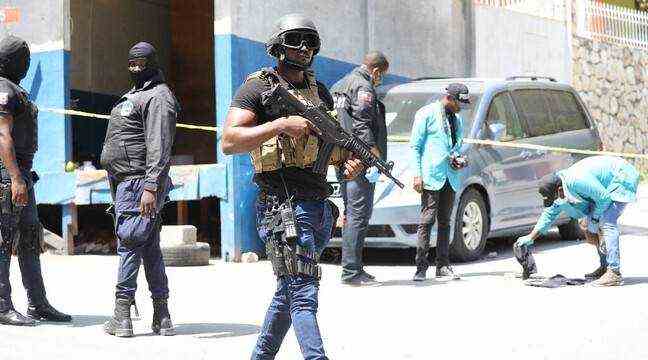Haiti is sinking deeper into a crisis that seems endless after the assassination of its president, Jovenel Moïse. In the night from Tuesday to Wednesday, the disputed president was killed by a commando team, at his home, announced the interim Prime Minister, Claude Joseph. The latter declared a state of siege in a country that was already without a government, without a Parliament and now without a president because the successor according to the constitution, the president of the Court of Cassation, died of Covid-19.20 minutes looks back on what led to the assassination of Jovenel Moïse and on the poor prospects of the country.
Why was President Jovenel Moïse contested?
In office since early 2017, Jovenel Moïse had no real political experience before reaching the highest office of the State and was ultimately not very well known in the country. He came from the economic elite and had promised to fight against poverty, for better education… “On the contrary, he made things worse,” warns the doctor in political science and researcher and Cetri (Belgium), Frédéric Thomas from the start. , interviewed by 20 minutes. “He was totally unpopular and faced enormous mistrust,” he says.
In 2018 and 2019, Jovenel Moïse, accused of corruption and of pursuing the seizure of the country’s property and institutions by a small elite, faced numerous demonstrations demanding his departure and social and political reforms. “He locks himself in denial and participates in the repression of this movement,” recalls Frédéric Thomas. Finally, Jovenel Moïse’s presidential term ended in February 2021, so he had held office illegitimately for five months.
Why was there no coup?
The link between this popular protest and the assassination of Jovenel Moïse does not seem direct. And for good reason, despite the vagueness that reigns since the assassination, there has been no coup d’état in Port-au-Prince. “We must understand this assassination as a settling of scores within the clique in power,” Judge Frédéric Thomas. If the researcher recognizes that there are currently no precise hypotheses on who killed and why President Moïse was killed, he believes that the population opposed to Jovenel Moïse did not want such an exit. crisis. “It only adds to the confusion, we are witnessing a headlong flight of the mafia drift of the Haitian elite. “
What is the security situation in Haiti?
The assassination of a president, however contested, throws a harsh light on the catastrophic security situation in Haiti, and in particular in the capital Port-au-Prince. It is indeed a double crisis, political and security, that the country has been facing for several years: “There has been a rise in the power of armed groups, which are not necessarily directly linked to the political class but are instrumentalised by the latter ”, describes Frédéric Thomas. The gangs divide the territory in front of a powerless political class: “The police do not intervene or intervene little. Because it is ill-prepared and ill-armed, but above all there is no political will to fight against gangs, ”explains the researcher.
So much so that the head of the Port-au-Prince gang federation, the G9, linked to power according to Frédéric Thomas, is a former policeman: Jimmy Chérizier, nicknamed Barbecue. Violence has exploded since the end of 2018 and in particular for a year: “The massacres have multiplied, even more in June with more than 150 dead in clashes in the working-class neighborhoods of Port-au-Prince. Fifteen people died in the clashes alone on the night of June 30 to July 1. Kidnappings for ransom are also rife.
What can happen now?
Theoretically, presidential and legislative elections as well as a constitutional referendum were to take place in September. Even before the assassination of President Jovenel Moïse, the timetable was not considered credible. “No condition is met: the Provisional Electoral Council, which is the body responsible for organizing the poll, is corrupt, it does not have the confidence of the population and the electoral lists are not clear”, describes Frédéric. Thomas. Moreover, in the security context described earlier, organizing elections today is taking the risk of seeing many polling stations being controlled by gangs, which would therefore also influence the votes.
The elite in power is pushing for these elections, but also the international community: again Wednesday the United States, in particular, called for respect for the electoral calendar. “It’s a kind of formalism of the international community, which prefers to have power, however corrupt it may be. But these are not the expectations of the population. “
Other solutions exist: for months Haitian civil society groups, such as unions, churches, certain parties, etc. have been trying to lay the foundations for a real political transition. With, according to Frédéric Thomas, three conditions: trials for those responsible for the massacres and human rights abuses in recent months; the creation of a space where civil society could meet, why not a constituent assembly … And the departure of President Moïse. “But obviously not in these circumstances”, tempers the researcher.

